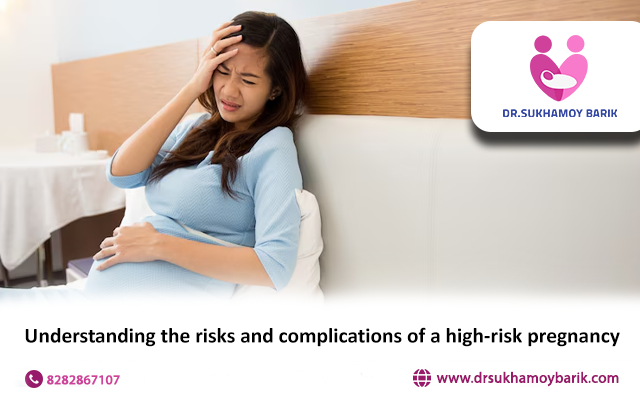A pregnancy that involves greater health risks due to various factors for a pregnant female, the baby or both is known as a high-risk pregnancy. The top PCOS doctor in Dum Dum helps us understand the risks and complications of a high-risk pregnancy.
Common risk factors of a high-risk pregnancy
The common risk factors of a high-risk pregnancy are as follows:
- Advanced maternal age
Pregnancy in females above the age of 35 is considered a higher risk due to increased possibilities of conditions like gestational diabetes, preeclampsia, chromosomal abnormalities, and difficulties with conception and delivery.
- Uterine anomalies
Structural abnormalities of the uterus, like fibroids, uterine septum or a bicornuate uterus, may increase the risk of complications during pregnancy.
- History of stillbirth or infant loss
Females who have previously experienced stillbirth, neonatal death or recurrent miscarriages may be at increased risk of problems in subsequent pregnancies and require closer monitoring.
- Multiple gestations
Pregnancies with twins, triplets or higher-order multiples are considered high-risk due to an increase in the risk of complications.
- Pre-existing medical issues
Certain pre-existing health conditions, like hypertension, cardiac disease, autoimmune disorders, kidney disease and obesity, may increase the risk of complications during a pregnancy. A high-risk pregnancy needs close monitoring and proper management to reduce the possibilities of complications, so ensure that you consult with the best PCOS doctor in Dum Dum.
Complications of a high-risk pregnancy
High-risk pregnancies may be associated with various complications that may include:
- Preterm birth
Delivery before 37 weeks of pregnancy is known as preterm birth. It is a common complication of high-risk pregnancies in which babies born prematurely may face health problems like respiratory distress syndrome, feeding difficulties and developmental delays.
- Low birth weight
Mothers with high-risk pregnancies may deliver babies with low birth weight. This increases the risk of health problems such as infections, breathing difficulties and developmental delays.
- Maternal health complications
High-risk pregnancies may also pose risks to the mother’s health, including an increased risk of complications like haemorrhage, blood clots and postpartum depression.
- Foetal Growth Restriction
In a few high-risk pregnancies, the foetus may not develop at the expected rate in the womb, leading to foetal growth restriction. This condition may result from factors like placental insufficiency and maternal health conditions.
- Congenital anomalies
Certain medical conditions or genetic factors may increase the risk of congenital anomalies (birth defects) in the foetus. Prenatal screening and diagnostic tests may be recommended to assess the baby’s health and development.
Conclusion
The highly skilled PCOS doctor in Dum Dum develops personalised treatment plans to suit the needs of individuals.
 8282867107
8282867107 sukhamoy83@gmail.com
sukhamoy83@gmail.com
